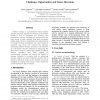Free Online Productivity Tools
i2Speak
i2Symbol
i2OCR
iTex2Img
iWeb2Print
iWeb2Shot
i2Type
iPdf2Split
iPdf2Merge
i2Bopomofo
i2Arabic
i2Style
i2Image
i2PDF
iLatex2Rtf
Sci2ools
115
click to vote
ICSM
2009
IEEE
2009
IEEE
Maintenance and agile development: Challenges, opportunities and future directions
Software entropy is a phenomenon where repeated changes gradually degrade the structure of the system, making it hard to understand and maintain. This phenomenon imposes challenges for organizations that have moved to agile methods from other processes, despite agile’s focus on adaptability and responsiveness to change. We have investigated this issue through an industrial case study, and reviewed the literature addressing software entropy, focusing on the detection of “code smells” and their treatment by refactoring. We found that in order to remain agile despite of software entropy, developers need better support for understanding, planning and testing the impact of changes. However, it is exactly work on refactoring decision support and task complexity analysis that is lacking in literature. Based on our findings, we discuss strategies for dealing with entropy in this context and present avenues for future research.
Agile Methods | ICSM 2009 | Phenomenon Imposes Challenges | Software Engineering | Software Entropy |
Related Content
| Added | 24 May 2010 |
| Updated | 24 May 2010 |
| Type | Conference |
| Year | 2009 |
| Where | ICSM |
| Authors | Geir Kjetil Hanssen, Aiko Fallas Yamashita, Reidar Conradi, Leon Moonen |
Comments (0)

